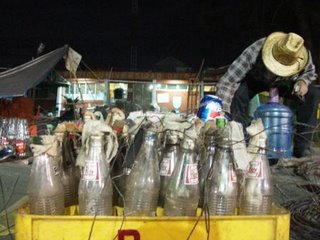Oaxaca Presente!

Here's a short article written on short notice for a student paper at a small college in scenic upstate New York. Put together by Sam and Elliott, it provides a brief (brief brief) overview of the situation in Oaxaca, and the recent murder of our friend Brad Will.
Oaxaca Presente!
To begin with, we are not neutral. Two weeks ago, PRIsta paramilitary forces outside Oaxaca City murdered our friend Brad Will. He was targeted because he was a journalist, and he died with his camera in his hands. Specifically, he was killed because he was an independent American journalist portraying the real face of the popular uprising in Oaxaca. His death, of course, is one of many—for some time, paramilitary websites have showcased the names, addresses and photographs of prominent Oaxacan dissidents. Visitors to the sites are encouraged to “neutralize these threats to our way of life.” The murdered bear a large red X over their faces.While casualties in Oaxaca have not been tallied, the vast majority has undoubtedly been inflicted on the civilian population. In spite of this, and massacres in other centers of resistance such as Atenco, Mexico will soon become a member of the UN Human Rights Commission. Remaining neutral in light of all this would be impossible for us.
It is remarkable that the struggle in Oaxaca began six months ago as a Oaxacan teacher’s strike for better pay and classroom resources, a yearly occurrence for the last quarter-century. Following a violent police attack on a striker’s encampment in the central plaza of Oaxaca City, popular resistance increased dramatically. Barricades were erected, government buildings were occupied, and the people of Oaxaca launched a campaign of largely non-violent resistance. In particular, this resistance has given rise to the Asemblea Popular del Pueblo de Oaxaca (APPO), the Popular Assembly of the People of Oaxaca, which functions as a kind of horizontal, autonomous governing body.
From the start, one of the central demands of the APPO has been the removal of Oaxaca’s fraudulently elected governor, Ulises Ruiz Ortiz. None of the major Mexican political parties, including Ruiz’s own, have defended the governor—and though Ruiz is currently exiled in Mexico City, he has retained his position. There seem to be two reasons for this.
Firstly, removing Ruiz from office before December 1st would nullify several transnational mining and agricultural contracts negotiated under his governorship. These contracts are an essential part of Plan Puebla Panama, the free-market proposal championed by both President Fox and his soon-to-be successor, Filipe Calderon. Secondly, appeasing a popular rebellion in Oaxaca could easily embolden other insurrectionary movements, which in the past year have organized themselves across Mexico. Alongside recent uprisings in Atenco, as well as the Zapatista caravan spearheading the Other Campaign, Oaxaca poses a very real threat to the sovereignty of the Mexican state.
Of course, the Mexican military could easily crush the resistance in Oaxaca if force were the deciding factor. But for months, the arms of the Mexican state have been bound by the power of national and international attention. Surrounded by thousands of federal gunmen, the APPO and local students have maintained Radio Universidad, a guerilla radio station that has become the voice of Oaxaca’s popular movement. Radio Universidad continues to broadcast, even after several attempts to shut down the station, and numerous attacks by armed paramilitaries.
Brad Will traveled to Oaxaca to document the reality of an oppressed and resisting people. Since his murder, the Mexican government has used his death as a pretext for increased, militant attacks on the people of Oaxaca—a state that is home to the largest indigenous population in Mexico. Now the death of one North American has prompted an unprecedented escalation of violence from the Mexican political establishment. This is exactly the kind of brutality that Brad wanted to document. It is, in fact, the reason he was there.
